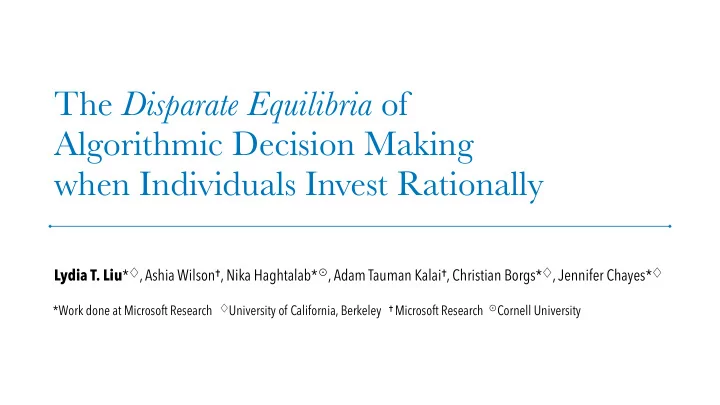

The Disparate Equilibria of Algorithmic Decision Making when Individuals Invest Rationally Lydia T. Liu * ♢ , Ashia Wilson ✝ , Nika Haghtalab* ☉ , Adam Tauman Kalai ✝ , Christian Borgs* ♢ , Jennifer Chayes* ♢ *Work done at Microsoft Research ♢ University of California, Berkeley ✝ Microsoft Research ☉ Cornell University
Machine learning models are being trained and used to make decisions about people, allocating resources and opportunities.
People tend to change their behavior in response to how these decisions are made.
Humans responding to algorithms Pros Cons • People strategically change their features • Algorithms can incentivize humans to game the algorithm [HMPW16, HIV19, to take “improving” actions over MMDM19] “gaming” actions [KR19] • Algorithms fail to reward certain groups, • Algorithm rewards people discouraging them from making beneficial appropriately, encouraging them investments [CL93, this work] to pursue beneficial investments, e.g. acquiring job skills, preparing • There is heterogeneity across groups for college leading to different responses [CL93, this work] [this work]
Company Jobs Hiring Policy Data points Skilled Not Skilled
Under these dynamics… 1. What kind of long-term outcomes (equilibria) are produced? 2. What kind of interventions produce desirable equilibria?
Model for individual investment • Given the current hiring policy , should I invest in acquiring job skills (become � ) if ‣ It costs me C to do that ‣ I will develop features (e.g. resume, scores) that depend on my group A and this boosts my chances of being hired by β (A) • I will invest in job skills if and only if my expected gain > 0. • Individual-level decisions determine the overall qualification rate in each group.
Model for institution’s response • Accepting skilled individuals is a gain, accepting unskilled individuals is a loss. • Picks current hiring policy • out of a chosen model class (e.g. linear Skilled models on observable features) Not Skilled • to maximize its expected profit , which depends on the qualification rates in each group.
Dynamics of qualification rates current hiring policy qualification rates change over time new hiring policy Skilled Not Skilled qualification rates change over time eventually qualification rates stabilize — reached equilibrium !
What ensures “good” equilibria? Result: If there exists a zero-error hiring policy in the model class, there is a unique (non-trivial) equilibrium. • All groups have the same qualification rate at equilibrium. This is also the optimal qualification rate. • This also holds approximately if there exists a low-error hiring policy.
Challenge: Heterogeneity across groups • There exists a zero-error hiring policy for each Stable but unbalanced Stable group separately but not together. but unbalanced • Result: Then 2 types of equilibria exist 1. Only one group has the optimal qualification rate ( unbalanced ) — Stable 2. Both groups have the same qualification rate — Unstable Balanced • Almost never converge to a “balanced” long but unstable term outcome, even if you started close to one!
Takeaways • Long-term effectiveness of interventions depends on the dynamics 1. Decoupling the hiring policy by group: helps in the static setting, but not necessarily in the dynamic setting 2. Subsidizing the cost of investment in a disadvantaged group (More details in paper!) • Algorithms and re-training impact human decisions beyond their intended scope • Principled view of how feedback loops arise and implications for system design - more work is needed!
The Disparate Equilibria of Algorithmic Decision Making when Individuals Invest Rationally Thank you! Ashia Wilson Nika Haghtalab Adam Kalai Christian Borgs Jennifer Chayes
Recommend
More recommend